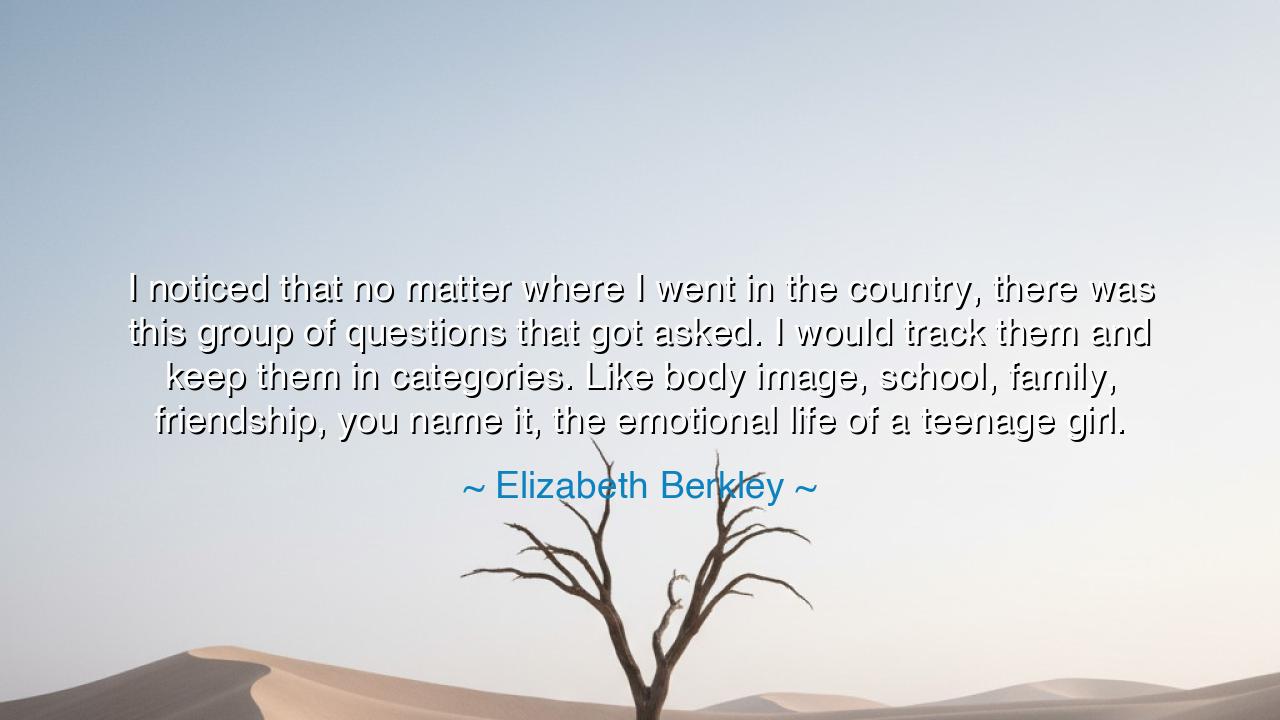
I noticed that no matter where I went in the country, there was
I noticed that no matter where I went in the country, there was this group of questions that got asked. I would track them and keep them in categories. Like body image, school, family, friendship, you name it, the emotional life of a teenage girl.






“I noticed that no matter where I went in the country, there was this group of questions that got asked. I would track them and keep them in categories. Like body image, school, family, friendship, you name it, the emotional life of a teenage girl.” In this deeply observant reflection, Elizabeth Berkley — actress, author, and advocate — reveals a truth both simple and profound: that though the world may appear vast and divided, the human heart beats with universal questions. Across all boundaries of geography, class, and culture, the young seek to understand themselves — their bodies, their families, their friends, and their worth. Berkley’s words, though gentle, carry the weight of an ancient lesson: that beneath the surface of difference lies the same yearning for love, belonging, and meaning.
At its core, this quote speaks to the shared emotional journey of youth — particularly of young women navigating a world that demands much yet understands little. Berkley, who became known to many through her early fame, later dedicated her life to listening — truly listening — to the voices of teenage girls. Through her workshops and her book Ask Elizabeth, she discovered that no matter where she went — from crowded cities to small towns — the questions were the same. “Am I enough?” “Will I be loved?” “Do I belong?” These are not trivial curiosities but eternal inquiries — the same ones that have haunted and shaped humankind since time began. The emotional life of a teenage girl, as she names it, is not small or fleeting; it is the awakening of identity itself.
The origin of Berkley’s insight lies in her compassion and in her own experience of fame and vulnerability. Having faced the harsh gaze of the public eye, she understood the fragile balance between self-image and self-worth. Her travels became not a performance, but a pilgrimage of empathy. She listened to countless young hearts and began to see patterns — universal threads of longing connecting one story to another. What she did, in truth, was what the philosophers of old once did: she collected the questions of the people, not to answer them with finality, but to honor them, to remind the world that our deepest emotions are not anomalies but reflections of our shared humanity.
Throughout history, the wisest teachers have understood this truth. Socrates did not teach by giving answers, but by asking questions — by guiding his students to discover their own wisdom through inquiry. So too did Elizabeth Berkley, in her own way, become a modern philosopher of compassion. She did not dismiss the questions of girls as naive or trivial; she recognized them as the first stirrings of consciousness. For the young, especially in a world that demands perfection, to voice their doubts is an act of courage. And to listen to those doubts — to truly hear them — is an act of love.
Her words also remind us that though technology, culture, and language change, the emotional struggles of growing up remain timeless. The ancients wrestled with the same insecurities: beauty, belonging, and worth. Cleopatra, as history tells, was haunted by her own image — revered for her beauty, yet trapped by it. Joan of Arc faced the scorn of those who could not understand a girl’s courage. Across the centuries, the questions persist, merely clothed in new forms. What Berkley saw in her travels was that these emotions are not weaknesses to be cured, but universal rites of passage — steps toward wisdom, empathy, and strength.
The lesson is clear: to heal a generation, one must first listen to it. Understanding begins with empathy. Every teacher, parent, and friend should remember that behind every question lies a story, and behind every story, a soul asking to be seen. When someone confides their pain, do not rush to advise — listen. When someone shares their uncertainty, do not dismiss it as immaturity — honor it as the beginning of wisdom. The act of listening itself is transformative; it tells the speaker, “You are not alone.” That message, more than any answer, is what the heart most craves.
In practical life, this teaching calls for gentleness and presence. When you encounter the young or the uncertain — those asking about body image, school, family, or friendship — resist the temptation to lecture. Instead, be a witness. Ask questions that lead them inward, not outward. Help them discover that their struggles are shared by millions, that there is strength in vulnerability, and that their worth is not determined by perfection, but by authenticity. The role of the wise is not to silence emotion, but to help it find its form.
For in the end, Elizabeth Berkley’s words are not only about teenage girls — they are about all of us. For we never truly outgrow our questions; we only learn to carry them with greater grace. Her insight reminds us that no matter how far we travel, our hearts still echo the same longings — for connection, for meaning, for friendship, for peace within ourselves. And so, let us remember: though we walk different roads, we ask the same questions beneath the same sky. And it is in listening, not in answering, that we find the bond that unites all souls — the quiet, enduring friendship of understanding.






AAdministratorAdministrator
Welcome, honored guests. Please leave a comment, we will respond soon